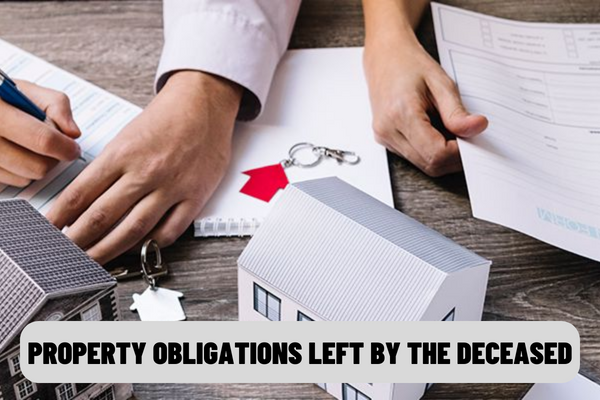What are the property obligations left by the deceased in Vietnam? Is it possible to disclaim an inheritance for the purpose of avoiding the performance of its property obligations left by the deceased?
When must the property obligations left by the deceased be fulfilled?
First, based on Article 614 of the 2015 Civil Code of Vietnam on time when rights and obligations of heirs arise as follows:
"Article 614. Time when rights and obligations of heirs arise
From the time of commencement of an inheritance, the heirs have the property rights and obligations left by the deceased."
Thus, from the time of commencement of an inheritance, the heir has the rights to inherit but must also fulfill the property obligations left by the deceased.
Regarding your problem, based on Article 615 of the 2015 Civil Code of Vietnam stipulating the performance of property obligations left by the deceased in Vietnam as follows:
“Article 615. Performance of property obligations left by deceased in Vietnam
1. A person entitled to an inheritance has the responsibility to perform the property obligations within the scope of the estate left by the deceased, unless otherwise agreed.
2. Where an estate has not yet been divided, the property obligations left by the deceased shall be performed by the administrator of the estate as agreed by the heirs.
3. Where an estate has already been divided, each heir shall perform those property obligations left by the deceased corresponding to, but not exceeding, that part of the estate that the heir has inherited, unless otherwise agreed.
4. Where the heir inheriting an estate under a will is not a natural person, it must perform the property obligations left by the deceased in like manner as a natural person.”
Based on the above provisions, when your mother dies, your mother's debt will be divided equally among your 3 siblings according to the law if in the case the estate has been divided and will only be payable within your mother's inheritance.
And because your mother's inherited property has been divided among your 3 siblings, so based on Clause 3 above, each heir shall fulfill the property obligations left by the deceased correspondingly but the value of the obligation does not exceed the portion of the property that you have received, unless otherwise agreed.
In your case, you and your siblings have to fulfill your mother's obligation to pay that debt.
That is, that VND 300 million debt will still be divided equally among all three people, but the payment obligation of each must not exceed the inheritance you three have received (in the case of your siblings, it is VND 200 million).
Property obligations left by the deceased (Image from the Internet)
What are the regulations on the order of priority of payment of property obligations left by the deceased?
The order of priority for payment of property obligations left by the deceased is specified in Article 658 of the 2015 Civil Code of Vietnam as follows:
“Article 658. Order of priority of payment
Property obligations and expenses related to an inheritance shall be paid in the following order of priority:
1. Reasonable funeral expenses in accordance with customary practice;
2. Outstanding support payments;
3. Expenditures on preservation of estate;
4. Allowances for dependants of the deceased;
5. Wages;
6. Monetary compensation for any damage;
7. Taxes and other liabilities owed to the State;
8. Other liabilities owed to other natural persons or juridical persons;
9. Fines;
10. Other expenses.”
Thus, the order of priority for payment of property obligations left by the deceased is specified as above.
What are the regulations on the right of disclaimer of inheritance?
According to the provisions of Article 620 of the 2015 Civil Code of Vietnam on disclaimer of inheritance as follows:
“Article 620. Disclaimer of inheritance
1. An heir may disclaim an inheritance, unless such disclaimer is for the purpose of avoiding the performance of its property obligations to other persons.
2. A disclaimer of an inheritance must be made in writing. A person disclaiming must notify the other heirs and the person authorized to distribute the estate.
3. The disclaimer of an estate must be expressed before the time of inherit distribution.”
According to this Article, an heir may disclaim an inheritance, unless such disclaimer is for the purpose of avoiding the performance of its property obligations to other persons.
LawNet
